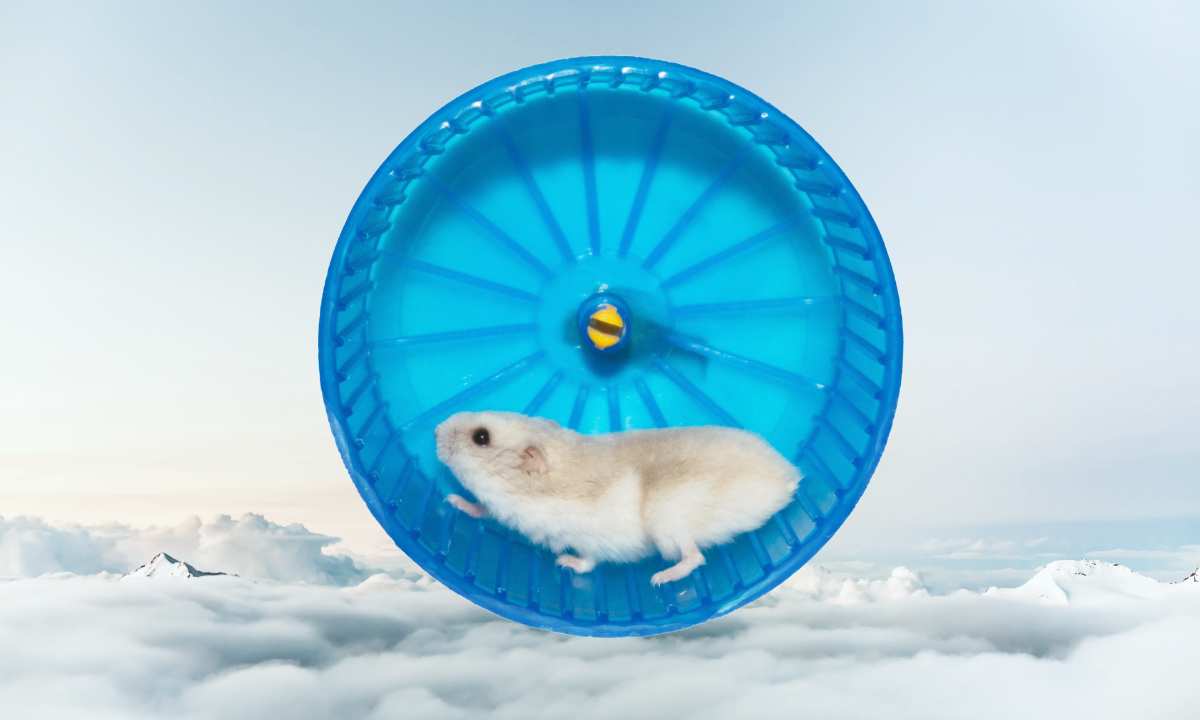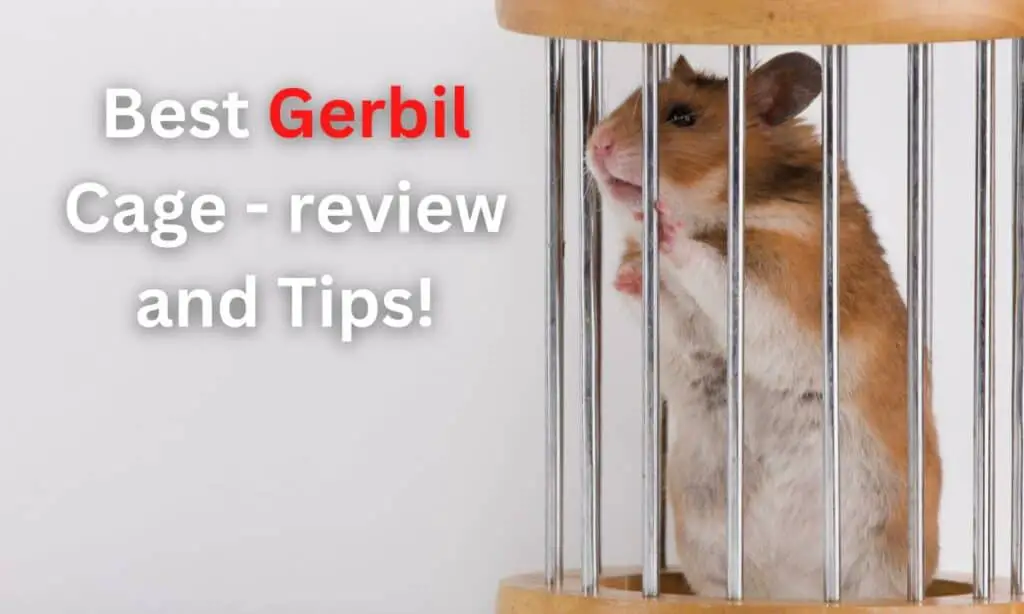Do gerbils need a wheel? Yes, indeed! Gerbils are lively, inquisitive pets that require regular exercise for optimal health. A running wheel serves as a perfect outlet for their instinctual need to scamper and explore. But it’s not just about having a wheel—it’s about having the right one.
In this guide, we’ll unravel the significance of wheels in a gerbil’s life, the essentials of selecting the perfect wheel, and additional exercise options for these charming creatures. Dive in to ensure your gerbil gets the best wheel deal!
Table of Contents
Understanding Gerbils and Their Exercise Needs
Gerbils are active pets, much like their rodent cousins, hamsters. They are small animals with a big need for exercise. In the wild, gerbils run around, forage, and chew to stay active and evade predators. In captivity, a running wheel can help mimic these natural behaviors.
A. The Natural Behavior of Gerbils
Gerbils are naturally curious and energetic creatures. They love to run around, explore, and chew on things. In the wild, gerbils can get a lot of exercise by foraging for food, digging tunnels, and evading predators. This instinct to stay active is still present in pet gerbils, even though they don’t face the same challenges as their wild counterparts.
B. The Importance of Exercise for Gerbils
Exercise is crucial for your gerbil’s physical and mental health. It helps keep your gerbil healthy by preventing obesity, maintaining muscle tone, and promoting good digestion. Mentally, exercise helps gerbils stay alert and content. Without enough exercise, gerbils may become stressed or depressed.
C. How a Wheel Caters to Gerbil’s Exercise Needs
An exercise wheel is a fantastic toy that allows your gerbil to run and stay active, even within the confines of a cage. Gerbils love to run, and a wheel allows them to do so to their heart’s content. It’s also a safer alternative to exercise balls, which can accidentally trap a gerbil’s tail or allow them to roll into furniture.
When choosing a gerbil wheel, it’s important to consider the size and material. The wheel needs to be big enough for your gerbil to run at a comfortable angle. A diameter of at least 8 inches is suitable for most gerbils. As for material, many wheels are made of plastic, but wooden wheels are also available. However, gerbils love to chew, and they may ingest plastic pieces, leading to potential health issues like infections.
Remember, while wheels provide a great way for gerbils to get their exercise, they should not be the only form of activity. Gerbils also need space to run around outside the wheel, bedding to burrow in, and items to gnaw on for their tooth health.
In the next section, we’ll delve into how to choose the right wheel for your gerbil, including factors like size, material, and safety features. So, stay tuned if you want to ensure you’re providing the best for your small pet.

Choosing the Right Wheel for Your Gerbil
Choosing the right wheel for your gerbil is crucial. Not all pet wheels are created equal, and what works for a hamster or a guinea pig might not be suitable for a gerbil. Here’s what you need to consider:
A. Factors to Consider When Buying a Gerbil Wheel
1. Size of the Wheel
The wheel needs to be large enough for your gerbil to run comfortably. A wheel that’s too small can cause your gerbil to arch its back unnaturally while running, leading to potential spinal injuries. As a rule of thumb, the wheel should be at least 8 inches in diameter for gerbils.
2. Material of the Wheel
Gerbils, like many rodents, have a habit of chewing everything they can get their teeth on. While plastic wheels are common, they may not be the best choice for gerbils. If your gerbil chews and ingests the plastic, it could lead to health problems. Metal or wooden wheels can be a safer choice, but make sure they’re coated to prevent any injuries.
3. Safety Features
Safety is paramount when it comes to choosing a wheel. Avoid wheels with rungs or mesh, as gerbils can get their tails or feet caught in the gaps, leading to injuries. Instead, opt for a wheel with a solid surface. Also, make sure the wheel is sturdy and doesn’t tip over easily.
B. Top Recommended Gerbil Wheels in the Market
There are several types of wheels suitable for gerbils, including traditional running wheels, saucer wheels, and running discs. Each type has its pros and cons, and the best choice depends on your gerbil’s preferences and your cage setup.

Traditional running wheels are the most common. They’re simple, effective, and come in a variety of sizes and materials. Saucer wheels, on the other hand, offer a fun alternative. They’re flat and allow your gerbil to run at a unique angle. However, they can take up more space in the cage.

Running discs is another option. They’re similar to saucer wheels but are typically made of metal and have a more enclosed design. They can be a good choice if your gerbil likes to feel more secure while running.
Remember, the best wheel for your gerbil is one that is safe, comfortable, and enjoyable for them to use. It’s also important to remember that wheels are not a substitute for other forms of exercise and enrichment. Gerbils also need opportunities to explore, forage, and play outside their cage in a secure playpen or similar area.
In the next section, we’ll discuss the potential dangers of choosing the wrong wheel for your gerbil. So, stay tuned to ensure you’re providing the best care for your furry friend.
The Dangers of the Wrong Wheel
Choosing the wrong wheel for your gerbil isn’t just a matter of wasted money—it could also pose serious risks to your pet’s health and well-being. Let’s delve into the potential dangers and hear some real-life experiences from other gerbil owners.
A. Potential Risks Associated with Inappropriate Wheels
Just as the right wheel can contribute to your gerbil’s happiness and health, the wrong wheel can lead to a host of problems. Here are a few risks associated with inappropriate wheels:
Injury: Wheels with rungs or gaps can be dangerous as gerbils can get their tails or feet caught, leading to painful injuries. Similarly, a wheel that’s too small can cause your gerbil to run in an unnatural position, potentially leading to spinal issues over time.
Stress: If a wheel is too noisy or unstable, it can cause stress for your gerbil. Gerbils are sensitive creatures, and chronic stress can lead to health problems and behavioral changes.
Ingestion of harmful materials: As we’ve mentioned before, gerbils love to chew. If a wheel is made from a material that can be chewed and ingested, like certain plastics, it could lead to digestive issues or even blockages.
Remember, it’s not just about keeping them entertained—it’s about keeping them safe and healthy.
In the next section, we’ll discuss how to properly set up and maintain your gerbil’s wheel to ensure it remains a safe and enjoyable source of exercise. So, stick around for more gerbil care tips!
Setting Up and Maintaining Your Gerbil’s Wheel
So, you’ve chosen the perfect wheel for your gerbil—congratulations! But the journey doesn’t end there. Proper setup and maintenance of the wheel are just as important as the wheel itself. Let’s dive into how you can ensure your gerbil’s wheel remains a safe and fun place for them to exercise.
A. Proper Placement of the Wheel in the Cage
First things first, where should you put the wheel in your gerbil’s cage? It’s best to place it in a spot where it won’t interfere with your gerbil’s other activities. Avoid placing it too close to food and water dishes to prevent contamination. Also, make sure it’s securely attached and won’t tip over while your gerbil is running.
B. Cleaning and Maintenance Tips
Like any other part of your gerbil’s cage, the wheel needs regular cleaning. Gerbils don’t typically make a mess in their wheel, but it can still collect bedding, food particles, and general dust. A quick wipe-down with a pet-safe disinfectant once a week should do the trick.
Also, keep an eye out for any signs of wear and tear. If you notice your gerbil has started to chew on the wheel or if it’s becoming noisy or unstable, it might be time for a replacement.
C. Observing Your Gerbil’s Behavior with the Wheel
Every gerbil is unique, and they might use their wheel differently. Some gerbils might run for hours, while others might prefer short bursts of activity. Some might even use their wheel as a bed or a bathroom! As long as your gerbil seems happy and is getting enough exercise, there’s no need to worry.
D. When to Replace Your Gerbil’s Wheel
Even the best wheel won’t last forever. If you notice your wheel becoming noisy, unstable, or worn out, it’s time to get a new one. Also, if your gerbil has outgrown their wheel or isn’t using it as much as it used to, it might be time for an upgrade.
E. Tips for Introducing Your Gerbil to the Wheel
When introducing a new wheel, give your gerbil some time to get used to it. They might be hesitant at first, but with a little patience, most gerbils will start to explore and eventually start running.
Remember, a wheel is an excellent tool for your gerbil to exercise and exhibit natural behaviors, but it’s not a substitute for other forms of enrichment. Make sure your gerbil also has plenty of opportunities to explore, chew, and burrow.
In the next section, we’ll discuss other forms of exercise for your gerbil
Other Forms of Exercise for Gerbils
While a wheel is a fantastic tool for your gerbil’s exercise, it shouldn’t be the only form of physical activity your pet gets. Gerbils are curious and active creatures, and they need a variety of exercises to stay healthy and happy. Let’s explore some alternatives to wheels and why variety is so important in a gerbil’s exercise routine.
A. Alternatives to Wheels
There are plenty of ways for your gerbil to get exercise outside of running on a wheel. Here are a few ideas:
Tunnels and Hideouts: Gerbils are natural burrowers. Providing tunnels and hideouts in their cage can encourage this behavior, giving them a great workout and mental stimulation.
Chew Toys: Chewing is a form of exercise for gerbils. It helps keep their teeth in good condition and can also be a great stress reliever. Make sure to provide a variety of safe chew toys for your gerbil.
Playpens: A secure playpen can give your gerbil a safe space to explore outside their cage. You can add toys, tunnels, and other items to make the playpen more exciting.
Handling and Playtime: Interacting with your gerbil can also be a great form of exercise. Just make sure to handle your gerbil gently and give them the option to return to their cage when they want to.
B. Importance of Variety in a Gerbil’s Exercise Routine
Just like humans, gerbils can get bored if their exercise routine is always the same. Variety not only keeps things interesting for your gerbil, but it also ensures they’re getting a well-rounded workout. For example, running on a wheel is great for cardio, but chewing and burrowing can help with muscle development and dental health.
Remember, every gerbil is unique. Some might love running on their wheel, while others might prefer burrowing or chewing. The key is to pay attention to your gerbil’s preferences and provide a range of options for them to choose from.
In the next section, we’ll wrap things up with a recap of the importance of wheels for gerbils and some final thoughts on responsible gerbil ownership. So, stick around for the conclusion of our gerbil exercise guide!
Conclusion
Well, folks, we’ve covered quite a bit of ground in this guide, haven’t we? From understanding the natural behaviors of gerbils to the importance of exercise, the role of a wheel, and even other forms of exercise—there’s a lot to take in. But don’t worry, we’re going to wrap it all up neatly in this conclusion.
A. Recap of the Importance of Wheels for Gerbils
Gerbils are active, curious creatures that need plenty of exercise to stay healthy and happy. A running wheel is an excellent tool that caters to their natural instinct to run and explore. It provides them with a safe and convenient way to burn off energy, even within the confines of a cage.
However, not just any wheel will do. The size, material, and safety features of the wheel are all important factors to consider. A wheel that’s too small, made of the wrong material, or poorly designed can cause more harm than good. So, it’s crucial to choose a wheel that’s suitable for your gerbil.
B. Encouragement for Responsible Gerbil Ownership
Owning a gerbil—or any pet, for that matter—is a big responsibility. It’s not just about providing food and a place to live; it’s also about ensuring they lead a fulfilling life. Exercise plays a crucial role in this.
Remember, a wheel is not a substitute for other forms of exercise and enrichment. Gerbils also need opportunities to explore, forage, and play outside their cage. Providing a variety of exercise options will help keep your gerbil physically fit and mentally stimulated.
In the end, the most important thing is to pay attention to your gerbil’s needs and behaviors. Every gerbil is unique, and what works for one might not work for another. So, observe your gerbil, learn their preferences, and adjust their environment accordingly.
Thank you for sticking with us through this guide. We hope it’s been informative and helpful in your journey as a gerbil owner. Remember, the information provided here is for informational purposes and should not replace professional veterinary advice. Always consult with a vet if you have concerns about your gerbil’s health.
Keep loving and caring for your gerbils, and they’ll reward you with their delightful antics and companionship. Happy gerbil parenting!
FAQ
Q: Can gerbils use a hamster wheel?
- A: While gerbils can use a hamster wheel, it is not recommended as hamster wheels are often too small and can cause injury to gerbils.
Q: What is a gerbil wheel?
- A: A gerbil wheel is an exercise wheel specifically designed for gerbils. It is typically larger than hamster wheels and made of solid material rather than mesh, which can cause injuries to gerbil feet and tails.
Q: Is a wheel a necessary toy for gerbils?
- A: A wheel is not a necessary toy for gerbils, but it is highly recommended as it helps them get the exercise they need and prevents boredom.
Q: Do gerbils chew on their wheel?
- A: Yes, gerbils may chew on their wheel, especially if it is made of plastic. Providing wooden toys as an alternative can help satisfy their chewing needs.
Q: How do I know which wheel is suitable for my gerbils?
- A: Look for a solid wheel that is at least 8 inches in diameter and 4 inches wide to ensure your gerbils have enough space to run comfortably. Make sure the wheel does not have any gaps or mesh that could cause injuries.
Q: What is an alternative to a gerbil exercise wheel?
- A: Providing a large, open space for your gerbils to run and play in can be an alternative to a wheel if you are unable to provide one. However, a wheel is still highly recommended.
Q: Can gerbils get caught in their wheel?
- A: Gerbils are unlikely to get caught in their wheel if it is the appropriate size and design. However, it is important to regularly check the wheel for wear and tear and replace it if necessary.
Q: Can chinchillas use a gerbil wheel?
- A: No, chinchillas should not use a gerbil wheel as they require a larger wheel with more space.
Q: Can degus use a gerbil wheel?
- A: No, degus require a larger wheel than gerbils and should not use a gerbil wheel.



